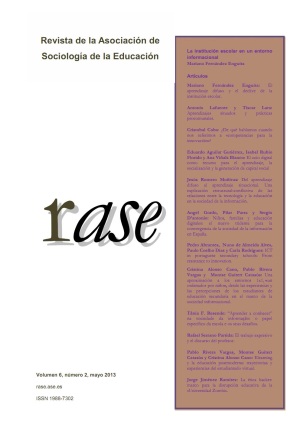Kids, digital families and schools: the new trident for the convergence of information society in Spain
DOI:
https://doi.org/10.7203/RASE.6.2.8356Keywords:
development, expanded education, digital family, children, digital agenda and policies, transformational society Abstract
Abstract
Since the middle of last decade specialized reports on the Information Society and their development indicators show an unusual interest in children and the Information and Communication Technologies. This new concern coincides with a stagnation period of Information Society especially pronounced in the Spanish case. Drawing upon an exploratory analysis of reports published from 1995-2013 we notice that such an interest in children and new technologies goes hand on hand with a greater emphasis on educational opportunities, prevention and active mediation of families and school in detriment of the risks, and digital equipment levels of households and schools. From a perspective aware of social processes, and with the aid of a sociological objectification exercise, in the rest of the article we move on to identifying the conditions of possibility and implications of the strategic role given to children and the desirable digital guidance and literacy which current institutions in charge of these kids’ primary socialization ought to pursuit according to the dominant discourse. In the last section we advance some reflections and hints about the strategic role of digital family in the implementation and development of the school 2.0 in the Spanish context under the logic inherent to a transformational society and its expanded education.
 Downloads
Downloads
Downloads
Published
How to Cite
-
Abstract572
-
PDF (Español)195
Issue
Section
License
![]()
This work is licensed under a Creative Commons Reconocimiento-NoComercial-CompartirIgual 4.0 Internacional.




